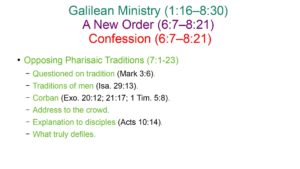The Ministry of Jesus in Galilee
Mark 1:16—8:30
A New King (1:16—3:6).
Kingdom is Near (1:15)
Popularity (1:16-45).
Conflict (2:1—3:6).
Jewish Leaders Reject Him (3:6)
A New Kingdom (3:7—6:6)
Kingdom Has Small Beginnings (4:3)
Continued Conflict (3:7-35).
Parables (4:1-34).
Identity (4:36—6:6).
Jesus’ Town Rejects Him (6:6)
A New Order (6:7—8:21)
Herod & Pharisees (8:15)
Confession (6:7—8:21).
Limited Commission (6:7-13).
John the Baptist Executed (6:14-29).
Five Thousand Fed (6:30-44).
Jesus Walks on Water (6:45-56).
Opposing Pharisaic Traditions (7:1-23).

Jesus Questioned on Traditions.
Traditions of men.
The practice of Corban.
Jesus speaks to the crowd.
Jesus then addresses the specific point that the Pharisees criticized Him on, but He addresses the crowd.
Recall, this tradition of washing hands and utensils had popular support, so they needed to hear this.
One is not defiled by that which is outward, but that which is inward.
This is a huge paradigm shift from what we see of the cleanliness laws of the OT.
The disciples called this a parable, really an illustration to help make His point.
Jesus explains it to His disciples.

Jesus expected His disciples to have greater understanding by this point, but they still don’t get it.
They should have figured out by now that what is external cannot defile a man. How is it they should have understood that by now? Recall all the things that Jesus did that should have made Him unclean: touching a leper, a woman with a flow of blood touching Jesus’ clothes, touching a dead girl’s hand.
The point is that none of these external things enters one’s heart or mind.
It goes through his digestive tract and is then gone.
The commentators suggest that the quotation should end with “eliminated” and that the rest of the verse is added on by Mark later.
This makes sense, since Peter himself doesn’t seem to have gotten it, even by Acts 10:14.
Whatever the case, all foods are now purified—enjoy your bacon and shrimp!
What truly defiles.
Whatever comes from the heart (or mind) can be evil and make one unclean.
Jesus gives a list of sins here, many of which we see elsewhere.
The evil thoughts mentioned here are likely an umbrella term for what follows, so there probably should be a colon after rather than a comma.
Fornication is any illicit sexual encounter, including adultery (though adultery is emphasized). This also includes homosexuality, incest, bestiality, and other pre- or extramarital relations.
Covetousness can also be translated as greed.
The Greek for “lewdness” can also be translated as “unbridled lust, excess, licentiousness, lasciviousness, wantonness, outrageousness, shamelessness, insolence,” also gluttony. This is why many forms of dancing falls under this category, possibly including Salome’s dance for Herod in Mark 6. Such acts incite such behaviors. Of course pornography falls under this category, too.
An evil eye – this is understood to be an idiom for envy.
Blasphemy is speaking evil against someone, including God.
Foolishness is sinful, particularly when it leads one to disregard God’s way.
This sinful acts bring true defilement and original in the heart/mind of man.

